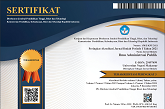Nurturing Sustainable Development: Unveiling the Dynamics of Implementing Slum Management Policies in Indonesia
(1) Institut Pemerintahan Dalam Negeri, Indonesia
(2) Institut Pemerintahan Dalam Negeri, Indonesia
(3) Institut Pemerintahan Dalam Negeri, Indonesia
(4) Institut Pemerintahan Dalam Negeri, Indonesia
(*) Corresponding Author
DOI: https://doi.org/10.26858/jiap.v13i1.50369
Abstract
This article explores the dynamics of implementing slum management policies in Indonesia, aiming to contribute to sustainable development efforts. The background highlights the significance of addressing slum areas in achieving sustainable urban development goals. The research objective is to unveil the complexities and challenges encountered during the implementation of slum management policies. A qualitative research approach involving interviews, document analysis, and case studies was employed to gain insights into policy formulation, implementation strategies, and their impact on slum communities. The findings reveal the multifaceted nature of slum management, encompassing social, economic, and environmental dimensions. The study identifies the need for integrated and participatory approaches, improved coordination among stakeholders, and targeted interventions to foster sustainable development in slum areas. These findings contribute to the understanding of effective policy implementation and provide insights for policymakers, practitioners, and stakeholders involved in urban development and slum management in Indonesia.
Keywords
Full Text:
PDFReferences
Akpabio, E. M., Wilson, N. A. U., Essien, K. A., Ansa, I. E., & Odum, P. N. (2021). Slums, women and sanitary living in South-South Nigeria. Journal of Housing and the Built Environment. https://doi.org/10.1007/s10901-020-09802-z
Bardhan Roy, M. (2006). Legal Awareness: An Innovative Policy Intervention Program for the Women in the Slum Areas of the City of Kolkata, India. In International Sociological Association.
Bossel, H. (1999). Indicators for sustainable development: theory, method, applications. International Institute for Sustainable Development, Winnipeg.
Cohen, I. S., Spring, Ú. O., Padilla, G. D., Paredes, J. C., Inzunza Ibarra, M. A., López, R. L., & Díaz, J. V. (2013). Forced migration, climate change, mitigation and adaptive policies in mexico: Some functional relationships. International Migration. https://doi.org/10.1111/j.1468-2435.2012.00743.x
Creswell, J. W. (2013). Research Design: Qualitative Approach, Quantitative and Mixed. Yogyakarta: Student Library.
Creswell, J. W., & Clark, V. L. P. (2017). Designing and conducting mixed methods research. Sage publications.
Eneh, O. C. (2021). Abuja slums: development, causes, waste-related health challenges, government response and way-forward. Environment, Development and Sustainability. https://doi.org/10.1007/s10668-020-01030-3
Escalona, M., & Oh, D. (2022). Governance Efficacy in Sustainable Slum Regeneration: Assessment framework for effective governance in slum tourism regeneration. Cases of study Medellín, Colombia and Busan, South Korea. Revista de Urbanismo. https://doi.org/10.5354/0717-5051.2022.61707
Ghaffarian, S., Roy, D., Filatova, T., & Kerle, N. (2021). Agent-based modelling of post-disaster recovery with remote sensing data. International Journal of Disaster Risk Reduction. https://doi.org/10.1016/j.ijdrr.2021.102285
Goudet, S., Jayaraman, A., Chanani, S., Osrin, D., Devleesschauwer, B., Bogin, B., Madise, N., & Griffiths, P. (2018). Cost effectiveness of a community based prevention and treatment of acute malnutrition programme in Mumbai slums, India. PLoS ONE. https://doi.org/10.1371/journal.pone.0205688
Khan, M. A. (2022). Livelihood, WASH related hardships and needs assessment of climate migrants: evidence from urban slums in Bangladesh. Heliyon. https://doi.org/10.1016/j.heliyon.2022.e09355
Kovacic, Z. (2022). Governing informality through representation: Examples from slum policies in Brazil and South Africa. Cities. https://doi.org/10.1016/j.cities.2018.07.009
Mugambe, R. K., Nuwematsiko, R., Ssekamatte, T., Nkurunziza, A. G., Wagaba, B., Isunju, J. B., Wafula, S. T., Nabaasa, H., Katongole, C. B., Atuyambe, L. M., & Buregyeya, E. (2022). Drivers of Solid Waste Segregation and Recycling in Kampala Slums, Uganda: A Qualitative Exploration Using the Behavior Centered Design Model. International Journal of Environmental Research and Public Health. https://doi.org/10.3390/ijerph191710947
Nkrumah Agyabeng, A., Nyigmah Bawole, J., Ahenkan, A., Mensah, J. K., & Preko, A. (2022). Understanding policy framework for slum governance in a developing country. International Journal of Public Leadership. https://doi.org/10.1108/IJPL-12-2021-0060
Nwameme, A. U., Tabong, P. T. N., & Adongo, P. B. (2018). Implementing Community-based Health Planning and Services in impoverished urban communities: Health workers’ perspective. In BMC Health Services Research. https://doi.org/10.1186/s12913-018-3005-1
Patel, B., Joshi, R., Ballaney, S., & Nohn, M. (2011). Slum Planning Schemes: A Statutory Framework for Establishing Secure Tenure and Improving Living Conditions in Indian Slums. Environment and Urbanization Asia. https://doi.org/10.1177/097542531000200105
Saputra, T., Yandra, A., Zahra, M., Eka, E., & Sufi, W. (2022). Implementation of Slum Settlement Management Policies in the District of Lima Puluh Kota Pekanbaru. Jurnal Manajemen Pelayanan Publik. https://doi.org/10.24198/jmpp.v5i2.36276
Yazdani, A. T., Muhammad, A., Nisar, M. I., Khan, U., & Shafiq, Y. (2021). Unveiling and addressing implementation barriers to routine immunization in the peri-urban slums of Karachi, Pakistan: a mixed-methods study. Health Research Policy and Systems. https://doi.org/10.1186/s12961-021-00691-4
Zain, D. P., Salman, D., & Baja, S. (2018). Model of slum area management based on socio-spatial approach. The case of Baubau City, Indonesia. Journal of Settlements and Spatial Planning. https://doi.org/10.24193/JSSP.2018.2.03
Article Metrics
Abstract view : 72 times | PDF view : 25 timesRefbacks
- There are currently no refbacks.
Copyright (c) 2023 Ida Nuryadi, Dahyar Daraba, Sampara Lukman, Eko Budi Santoso

This work is licensed under a Creative Commons Attribution 4.0 International License.
Diterbitkan oleh:
Program Studi Ilmu Administrasi Publik
Program Pascasarjana Universitas Negeri Makassar
JIAP Index By:

This work is licensed under a Creative Commons Attribution 4.0 International License.









